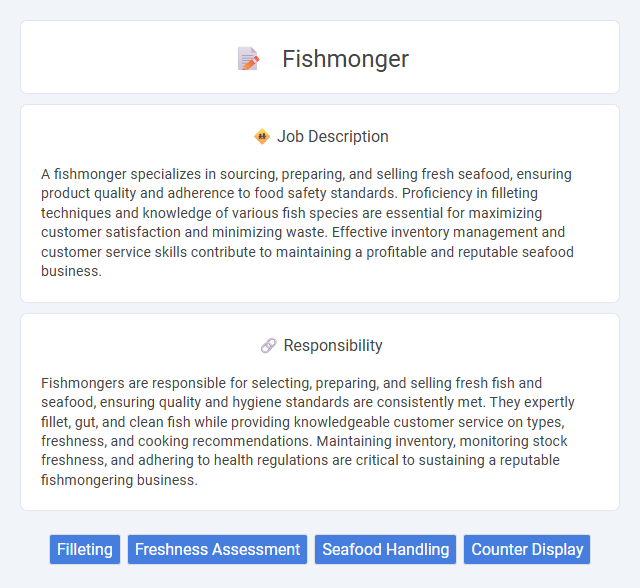
A fishmonger specializes in sourcing, preparing, and selling fresh seafood, ensuring product quality and adherence to food safety standards. Proficiency in filleting techniques and knowledge of various fish species are essential for maximizing customer satisfaction and minimizing waste. Effective inventory management and customer service skills contribute to maintaining a profitable and reputable seafood business.
Fishmongers are likely suited for individuals who can handle physically demanding work, including standing for long hours and lifting heavy loads. The job may be suitable for those with strong attention to hygiene and safety practices due to handling raw fish and seafood. It may be less appropriate for people with sensitivity to cold environments or poor tolerance for repetitive tasks.
Qualification
A fishmonger must possess in-depth knowledge of various types of seafood, including freshness indicators and sustainable sourcing practices. Proficiency in filleting, cleaning, and portioning fish is essential, along with understanding proper storage techniques to maintain quality and safety. Strong interpersonal skills and familiarity with food safety regulations, such as HACCP standards, enhance job performance and customer trust.
Responsibility
Fishmongers are responsible for selecting, preparing, and selling fresh fish and seafood, ensuring quality and hygiene standards are consistently met. They expertly fillet, gut, and clean fish while providing knowledgeable customer service on types, freshness, and cooking recommendations. Maintaining inventory, monitoring stock freshness, and adhering to health regulations are critical to sustaining a reputable fishmongering business.
Benefit
Working as a fishmonger likely offers the benefit of developing in-depth knowledge of seafood varieties and freshness, which enhances expertise in the culinary and retail sectors. There is a strong chance of gaining practical skills in knife handling, filleting, and customer service, improving both manual dexterity and communication abilities. This job may also provide steady employment opportunities in markets and grocery stores, potentially leading to career advancement in food sales or seafood supply chains.
Challenge
The fishmonger job likely presents challenges such as ensuring the freshness and quality of seafood under strict time constraints. Handling and preparing various types of fish may require specialized skills and attention to hygiene standards. Managing customer preferences and fluctuating supply chains could also contribute to the complexity of this occupation.
Career Advancement
Fishmongers can advance their careers by gaining expertise in seafood selection, handling, and quality control, which leads to roles such as seafood supervisor or wholesale buyer. Specialized knowledge in sustainable fishing practices and species identification enhances opportunities for managerial positions within retail or supply chain sectors. Continuous skills development, including customer service and inventory management, supports progression to higher-level jobs in seafood distribution and market operations.
Key Terms
Filleting
Expert fishmongers specialize in precise filleting techniques that maximize yield and ensure high-quality cuts suitable for retail or culinary use. Skilled filleting involves removing bones, skin, and scales efficiently, preserving the texture and freshness of various fish species. Mastery in filleting reduces waste and enhances customer satisfaction by providing neatly prepared portions ready for cooking.
Freshness Assessment
Fishmongers expertly evaluate seafood freshness by examining key indicators such as clear, bright eyes, firm flesh, and a mild, ocean-like aroma. They assess gill color, ensuring it remains vibrant red or pink, and check the texture to confirm the fish is resilient and not slimy. Proper freshness assessment guarantees high-quality product delivery and customer satisfaction in the seafood market.
Seafood Handling
Fishmongers specialize in seafood handling by expertly cleaning, filleting, and preparing fish and shellfish for sale or consumption. They ensure proper storage at optimal temperatures to maintain freshness and prevent spoilage. Knowledge of seafood species, hygiene standards, and sanitation protocols is essential for maintaining quality and safety.
Counter Display
A fishmonger managing the counter display must ensure fresh, high-quality seafood is attractively arranged to entice customers and maintain optimal temperature and hygiene standards. Effective display techniques include using crushed ice beds to preserve fish texture and color while highlighting product variety such as fillets, shellfish, and whole fish. Mastery in presentation directly impacts sales, customer satisfaction, and compliance with food safety regulations.
 kuljobs.com
kuljobs.com